Xiusi Chen
May
Why Reasoning Fails to Plan: A Planning-Centric Analysis of Long-Horizon Decision Making in LLM Agents
Jan 29, 2026Abstract:Large language model (LLM)-based agents exhibit strong step-by-step reasoning capabilities over short horizons, yet often fail to sustain coherent behavior over long planning horizons. We argue that this failure reflects a fundamental mismatch: step-wise reasoning induces a form of step-wise greedy policy that is adequate for short horizons but fails in long-horizon planning, where early actions must account for delayed consequences. From this planning-centric perspective, we study LLM-based agents in deterministic, fully structured environments with explicit state transitions and evaluation signals. Our analysis reveals a core failure mode of reasoning-based policies: locally optimal choices induced by step-wise scoring lead to early myopic commitments that are systematically amplified over time and difficult to recover from. We introduce FLARE (Future-aware Lookahead with Reward Estimation) as a minimal instantiation of future-aware planning to enforce explicit lookahead, value propagation, and limited commitment in a single model, allowing downstream outcomes to influence early decisions. Across multiple benchmarks, agent frameworks, and LLM backbones, FLARE consistently improves task performance and planning-level behavior, frequently allowing LLaMA-8B with FLARE to outperform GPT-4o with standard step-by-step reasoning. These results establish a clear distinction between reasoning and planning.
PEARL: Self-Evolving Assistant for Time Management with Reinforcement Learning
Jan 17, 2026Abstract:Overlapping calendar invitations force busy professionals to repeatedly decide which meetings to attend, reschedule, or decline. We refer to this preference-driven decision process as calendar conflict resolution. Automating such process is crucial yet challenging. Scheduling logistics drain hours, and human delegation often fails at scale, which motivate we to ask: Can we trust large language model (LLM) or language agent to manager time? To enable systematic study of this question, we introduce CalConflictBench, a benchmark for long-horizon calendar conflict resolution. Conflicts are presented sequentially and agents receive feedback after each round, requiring them to infer and adapt to user preferences progressively. Our experiments show that current LLM agents perform poorly with high error rates, e.g., Qwen-3-30B-Think has 35% average error rate. To address this gap, we propose PEARL, a reinforcement-learning framework that augments language agent with an external memory module and optimized round-wise reward design, enabling agent to progressively infer and adapt to user preferences on-the-fly. Experiments on CalConflictBench shows that PEARL achieves 0.76 error reduction rate, and 55% improvement in average error rate compared to the strongest baseline.
Current Agents Fail to Leverage World Model as Tool for Foresight
Jan 08, 2026Abstract:Agents built on vision-language models increasingly face tasks that demand anticipating future states rather than relying on short-horizon reasoning. Generative world models offer a promising remedy: agents could use them as external simulators to foresee outcomes before acting. This paper empirically examines whether current agents can leverage such world models as tools to enhance their cognition. Across diverse agentic and visual question answering tasks, we observe that some agents rarely invoke simulation (fewer than 1%), frequently misuse predicted rollouts (approximately 15%), and often exhibit inconsistent or even degraded performance (up to 5%) when simulation is available or enforced. Attribution analysis further indicates that the primary bottleneck lies in the agents' capacity to decide when to simulate, how to interpret predicted outcomes, and how to integrate foresight into downstream reasoning. These findings underscore the need for mechanisms that foster calibrated, strategic interaction with world models, paving the way toward more reliable anticipatory cognition in future agent systems.
Veri-R1: Toward Precise and Faithful Claim Verification via Online Reinforcement Learning
Oct 02, 2025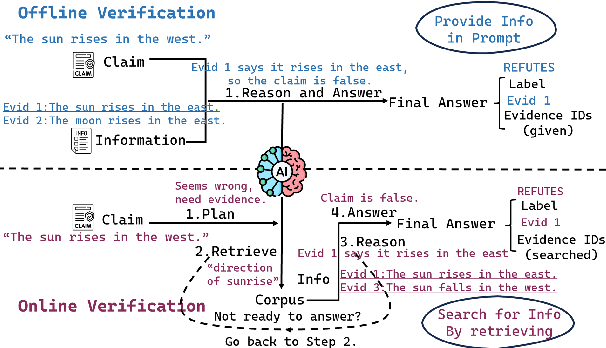

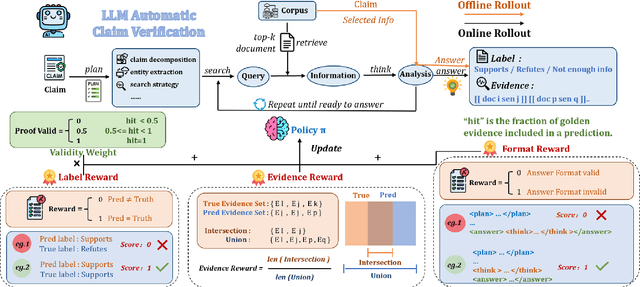

Abstract:Claim verification with large language models (LLMs) has recently attracted considerable attention, owing to their superior reasoning capabilities and transparent verification pathways compared to traditional answer-only judgments. Online claim verification requires iterative evidence retrieval and reasoning, yet existing approaches mainly rely on prompt engineering or predesigned reasoning workflows without offering a unified training paradigm to improve necessary skills. Therefore, we introduce Veri-R1, an online reinforcement learning (RL) framework that enables an LLM to interact with a search engine and to receive reward signals that explicitly shape its planning, retrieval, and reasoning behaviors. The dynamic interaction between models and retrieval systems more accurately reflects real-world verification scenarios and fosters comprehensive verification skills. Empirical results show that Veri-R1 improves joint accuracy by up to 30% and doubles evidence score, often surpassing larger-scale counterparts. Ablation studies further reveal the impact of reward components and the link between output logits and label accuracy. Our results highlight the effectiveness of online RL for precise and faithful claim verification and provide a foundation for future research. We release our code to support community progress in LLM empowered claim verification.
Beyond Log Likelihood: Probability-Based Objectives for Supervised Fine-Tuning across the Model Capability Continuum
Oct 01, 2025Abstract:Supervised fine-tuning (SFT) is the standard approach for post-training large language models (LLMs), yet it often shows limited generalization. We trace this limitation to its default training objective: negative log likelihood (NLL). While NLL is classically optimal when training from scratch, post-training operates in a different paradigm and could violate its optimality assumptions, where models already encode task-relevant priors and supervision can be long and noisy. To this end, we study a general family of probability-based objectives and characterize their effectiveness under different conditions. Through comprehensive experiments and extensive ablation studies across 7 model backbones, 14 benchmarks, and 3 domains, we uncover a critical dimension that governs objective behavior: the model-capability continuum. Near the model-strong end, prior-leaning objectives that downweight low-probability tokens (e.g., $-p$, $-p^{10}$, thresholded variants) consistently outperform NLL; toward the model-weak end, NLL dominates; in between, no single objective prevails. Our theoretical analysis further elucidates how objectives trade places across the continuum, providing a principled foundation for adapting objectives to model capability. Our code is available at https://github.com/GaotangLi/Beyond-Log-Likelihood.
Perception-Aware Policy Optimization for Multimodal Reasoning
Jul 08, 2025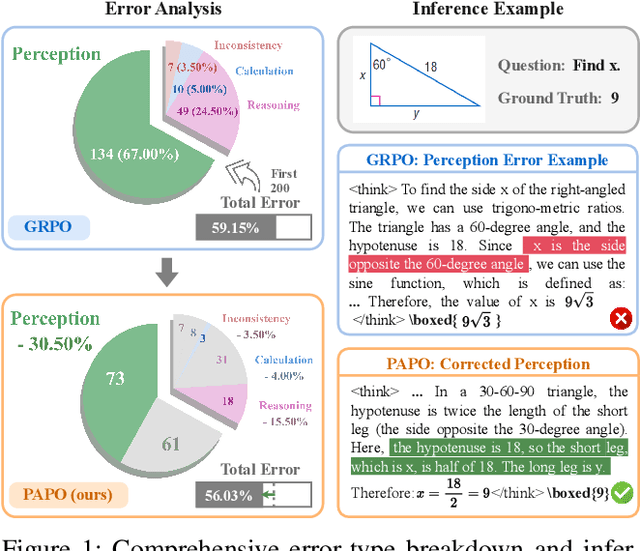

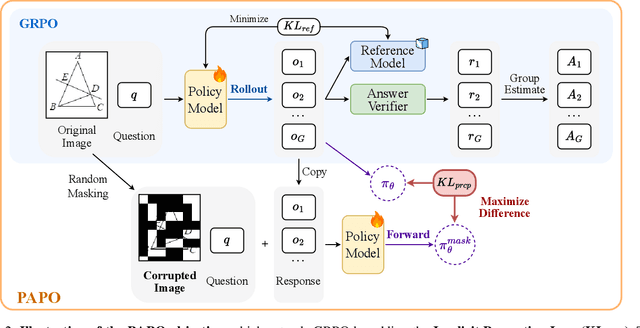
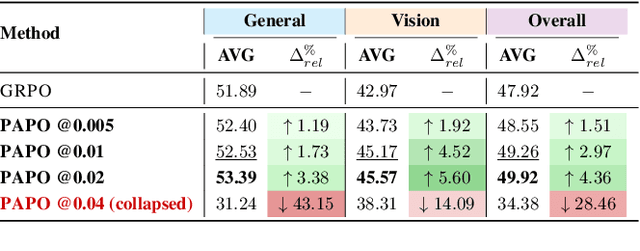
Abstract:Reinforcement Learning with Verifiable Rewards (RLVR) has proven to be a highly effective strategy for endowing Large Language Models (LLMs) with robust multi-step reasoning abilities. However, its design and optimizations remain tailored to purely textual domains, resulting in suboptimal performance when applied to multimodal reasoning tasks. In particular, we observe that a major source of error in current multimodal reasoning lies in the perception of visual inputs. To address this bottleneck, we propose Perception-Aware Policy Optimization (PAPO), a simple yet effective extension of GRPO that encourages the model to learn to perceive while learning to reason, entirely from internal supervision signals. Notably, PAPO does not rely on additional data curation, external reward models, or proprietary models. Specifically, we introduce the Implicit Perception Loss in the form of a KL divergence term to the GRPO objective, which, despite its simplicity, yields significant overall improvements (4.4%) on diverse multimodal benchmarks. The improvements are more pronounced, approaching 8.0%, on tasks with high vision dependency. We also observe a substantial reduction (30.5%) in perception errors, indicating improved perceptual capabilities with PAPO. We conduct comprehensive analysis of PAPO and identify a unique loss hacking issue, which we rigorously analyze and mitigate through a Double Entropy Loss. Overall, our work introduces a deeper integration of perception-aware supervision into RLVR learning objectives and lays the groundwork for a new RL framework that encourages visually grounded reasoning. Project page: https://mikewangwzhl.github.io/PAPO.
DecisionFlow: Advancing Large Language Model as Principled Decision Maker
May 27, 2025Abstract:In high-stakes domains such as healthcare and finance, effective decision-making demands not just accurate outcomes but transparent and explainable reasoning. However, current language models often lack the structured deliberation needed for such tasks, instead generating decisions and justifications in a disconnected, post-hoc manner. To address this, we propose DecisionFlow, a novel decision modeling framework that guides models to reason over structured representations of actions, attributes, and constraints. Rather than predicting answers directly from prompts, DecisionFlow builds a semantically grounded decision space and infers a latent utility function to evaluate trade-offs in a transparent, utility-driven manner. This process produces decisions tightly coupled with interpretable rationales reflecting the model's reasoning. Empirical results on two high-stakes benchmarks show that DecisionFlow not only achieves up to 30% accuracy gains over strong prompting baselines but also enhances alignment in outcomes. Our work is a critical step toward integrating symbolic reasoning with LLMs, enabling more accountable, explainable, and reliable LLM decision support systems. We release the data and code at https://github.com/xiusic/DecisionFlow.
Graph Foundation Models: A Comprehensive Survey
May 21, 2025Abstract:Graph-structured data pervades domains such as social networks, biological systems, knowledge graphs, and recommender systems. While foundation models have transformed natural language processing, vision, and multimodal learning through large-scale pretraining and generalization, extending these capabilities to graphs -- characterized by non-Euclidean structures and complex relational semantics -- poses unique challenges and opens new opportunities. To this end, Graph Foundation Models (GFMs) aim to bring scalable, general-purpose intelligence to structured data, enabling broad transfer across graph-centric tasks and domains. This survey provides a comprehensive overview of GFMs, unifying diverse efforts under a modular framework comprising three key components: backbone architectures, pretraining strategies, and adaptation mechanisms. We categorize GFMs by their generalization scope -- universal, task-specific, and domain-specific -- and review representative methods, key innovations, and theoretical insights within each category. Beyond methodology, we examine theoretical foundations including transferability and emergent capabilities, and highlight key challenges such as structural alignment, heterogeneity, scalability, and evaluation. Positioned at the intersection of graph learning and general-purpose AI, GFMs are poised to become foundational infrastructure for open-ended reasoning over structured data. This survey consolidates current progress and outlines future directions to guide research in this rapidly evolving field. Resources are available at https://github.com/Zehong-Wang/Awesome-Foundation-Models-on-Graphs.
ModelingAgent: Bridging LLMs and Mathematical Modeling for Real-World Challenges
May 21, 2025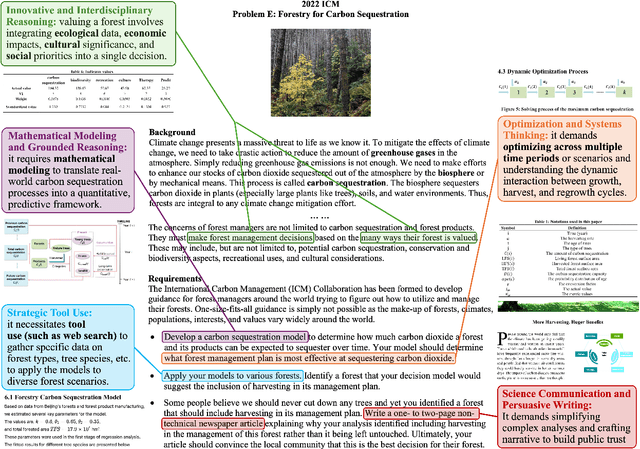
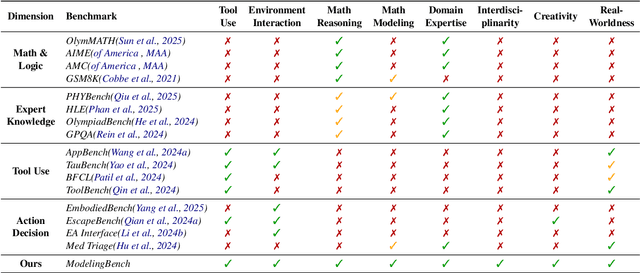


Abstract:Recent progress in large language models (LLMs) has enabled substantial advances in solving mathematical problems. However, existing benchmarks often fail to reflect the complexity of real-world problems, which demand open-ended, interdisciplinary reasoning and integration of computational tools. To address this gap, we introduce ModelingBench, a novel benchmark featuring real-world-inspired, open-ended problems from math modeling competitions across diverse domains, ranging from urban traffic optimization to ecosystem resource planning. These tasks require translating natural language into formal mathematical formulations, applying appropriate tools, and producing structured, defensible reports. ModelingBench also supports multiple valid solutions, capturing the ambiguity and creativity of practical modeling. We also present ModelingAgent, a multi-agent framework that coordinates tool use, supports structured workflows, and enables iterative self-refinement to generate well-grounded, creative solutions. To evaluate outputs, we further propose ModelingJudge, an expert-in-the-loop system leveraging LLMs as domain-specialized judges assessing solutions from multiple expert perspectives. Empirical results show that ModelingAgent substantially outperforms strong baselines and often produces solutions indistinguishable from those of human experts. Together, our work provides a comprehensive framework for evaluating and advancing real-world problem-solving in open-ended, interdisciplinary modeling challenges.
RM-R1: Reward Modeling as Reasoning
May 05, 2025Abstract:Reward modeling is essential for aligning large language models (LLMs) with human preferences, especially through reinforcement learning from human feedback (RLHF). To provide accurate reward signals, a reward model (RM) should stimulate deep thinking and conduct interpretable reasoning before assigning a score or a judgment. However, existing RMs either produce opaque scalar scores or directly generate the prediction of a preferred answer, making them struggle to integrate natural language critiques, thus lacking interpretability. Inspired by recent advances of long chain-of-thought (CoT) on reasoning-intensive tasks, we hypothesize and validate that integrating reasoning capabilities into reward modeling significantly enhances RM's interpretability and performance. In this work, we introduce a new class of generative reward models -- Reasoning Reward Models (ReasRMs) -- which formulate reward modeling as a reasoning task. We propose a reasoning-oriented training pipeline and train a family of ReasRMs, RM-R1. The training consists of two key stages: (1) distillation of high-quality reasoning chains and (2) reinforcement learning with verifiable rewards. RM-R1 improves LLM rollouts by self-generating reasoning traces or chat-specific rubrics and evaluating candidate responses against them. Empirically, our models achieve state-of-the-art or near state-of-the-art performance of generative RMs across multiple comprehensive reward model benchmarks, outperforming much larger open-weight models (e.g., Llama3.1-405B) and proprietary ones (e.g., GPT-4o) by up to 13.8%. Beyond final performance, we perform thorough empirical analysis to understand the key ingredients of successful ReasRM training. To facilitate future research, we release six ReasRM models along with code and data at https://github.com/RM-R1-UIUC/RM-R1.
 Add to Chrome
Add to Chrome Add to Firefox
Add to Firefox Add to Edge
Add to Edge